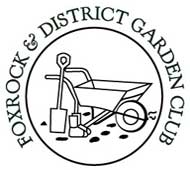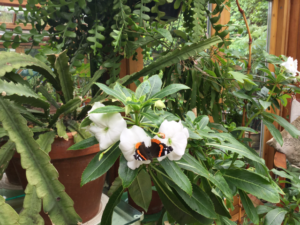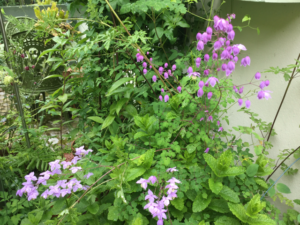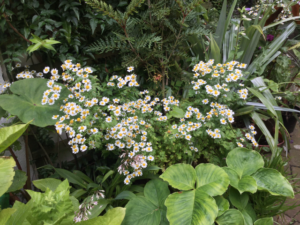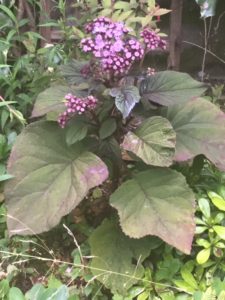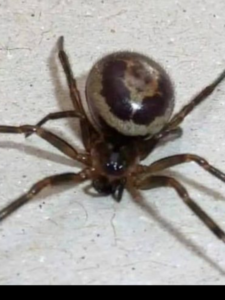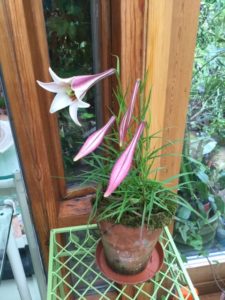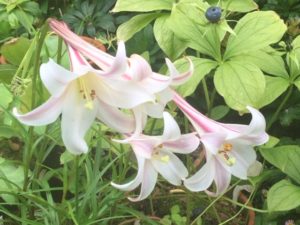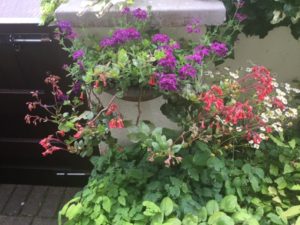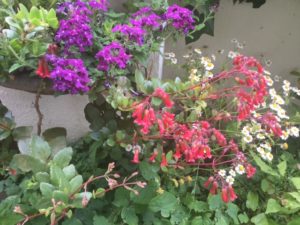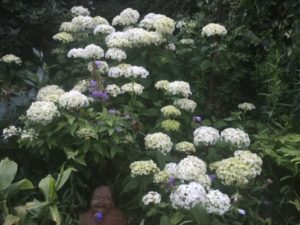AUGUST IN OUR GARDENS by Philippa Thomas
We’re not in the same boat but we’re in the same storm. At this stage, some of us are more aware of the fragility, the precious nature of life and then, the precious nature of Nature, itself. Time can be elastic and then, it can be the opposite…..We still have the entire month of August and September. – What an honour it is to be able to manage our little patch of the planet and decide, exactly what can grow there. We have the power to decide what plants and creatures can share this space with us.
- Impatiens Sodenii, Native To South Africa, Grows 2/3 Feet Tall With Red Admirable.
Conservation Plant Life has said, that rare wild flowers could start blooming on our roadsides/verges, due to the coronavirus lockdown and help feed declining bee and insect population. Councils have been leaving roadside verges etc. uncut, as they redistribute resources to other services, creating mini-meadows. Commercial tomato growers have been battling their own deadly virus this year with at least five reported outbreaks of tomato brown rugose fruit virus, U.K.
Really, letting plants grow where they want can work wonders. When we see romantic gardens, we usually realise they have embraced self sowing, so possibly, best to leave some in our biggest soil gaps.
- Thalictrums Are Some Of The Best And Easiest Plants To Grow And Give Great Height To Borders….I Have Three Species Growing In Deep David Austin Rose Pots, Placed Behind An Old Enamel Kitchen Sink.
- Are You A Traditional Gardener?
- Are You An Eco-Conscious Gardener?
- Are You A Wildlife Gardener?
- Or An Organic Gardener?
Every garden no matter what its size, can be a haven for hungry pollinators. Dandelions, Dead Nettles, Self heal (herb), native to Ireland, Birds foot trefoil, Clover……The more of these flowers the better and they all just love tall grass. A long flowering meadow located in part of our gardens can provide food and shelter for so many pollinators. We have 99 bee species in Ireland, one honeybee, 21 bumblebees and 77 solitary bee species. Unfortunately, one third of our 98% bee species are at risk of distinction. This is because we have drastically reduced the amount of food/flowers and safe nesting sites in our landscapes. Did you know that Clover used to be called ‘bee bread’? This is because it provides such important food in its pollen and nectar stores for bees. Bramble, too provides vital food for pollinating insects in late Summer and birds and mammals in Autumn. Ivy berries then, are very important to birds in late Winter…Many organisms in our gardens including wasps, lacewings, beetles, spiders and centipedes are natural pest controllers, as well as being a food source for birds and mammals. Then, earthworms surface at night to pull down fallen leaves, waste and debris of any kind, into their burrows and as they move, they mix nutrients throughout the soil….It’s actually, our small plants, wildflowers and the bugs, caterpillars, spiders and other creepy crawlies that are so important as they form the base of our food webs that support all our more attractive birds and mammals that we may want to help the most.
- Couldn’t Live Without Feverfew, Which Self-Seeds Endlessly Around Our Gardens. It Is A Medical Herb Used To Prevent Headaches.
Soils fed with organic materials, such as compost and farmyard, preferably horse manure contained (in survey), 50% more earthworms than soils where no organic matter was added. Earthworms help to improve the structure of our soil as well as the fertility, so adding either organic matter dug in as a mulch/composted bark can make a significant difference to our plants. These are vital ingredients to encourage worms…. We’re also now, beginning to see more composts made of other sources such as sheep’s wool and bracken.
- Bought This Beauty In Jimi Blakes Garden And Its Evergreen….
MAKING A MEADOW
If You want to develop a wildflower patch in your garden, Yellow Rattle is a very special plant. It gets its name because its seeds rattle in their cases when you shake their flower head. It is also called the meadow maker. It is an annual that is partly parasitic,/weakens grasses, this helps other wildflowers to grow …… If you allow too much grass, it dominates. If you want to plant wildflowers, it’s always advisable to use native seed of local provenance. Green shoots always find their way and slow explosions will happen ….. Why not collect your own local wildflower seed and cultivate it in seed trays before adding to the garden …… We have no meadow as our garden doesn’t lend itself to such, though we get loads of wildlife and insects. In fact recently, during our warm spell, I almost lay on a False Widow Spider. I believe, likewise one bit the paw of a pet dog who lives in St. Patrick’s Square.
- I, Almost Lay On This False Widow Spider During Our Recent Warm Spell.
PERHAPS, ENCOURAGE YOUR CHILDREN, GRANDCHILDREN, NIECES, NEPHEWS, GODCHILDREN, TO GROW A RAINBOW.
- Nasturtiums, Red.
- Marigolds, Orange.
- Sunflowers, Yellow.
- Herbs, Green.
- Cornflowers, Blue.
- Asters, Purple.
- Cosmos, Pink.
Create Your Very Own Spectrum. Alternatively, children could make a rainbow on a sheet of paper using petals and leaves from the garden, stick on with a little glue.
- Dwarf Lilium Longiflorum, Approx 14 Yrs Old. Highly Reliable.
- Again, Isn’t It Beautiful…..
Might Do, Maybe August Jobs.
Research has shown that the more urbanised humans have become the more we actually need exposure to nature. A sterile garden with tightly mown grass or hard artificial surfaces, offers humans little or no exposure to nature, no buzz from busy insects, no birdsong, no life.
- Always, check for the presence of active birds’ nests before trimming any hedge as it is an offence to disturb them. If you have a nest, please wait until later in the year when the birds have left.
- Keep picking annuals or they will return to seed or grow on, in order to save seed such as Opium Poppies, sow in modular trays in September or March.
- Lift small pots to check if they need watering. The lighter they are, the drier the soil.
- Take your time watering each pot, its best to give them a thorough soak. When tomatoes split, it is usually a consequence of irregular watering.
- Keep well ventilated, open doors and roof windows and keep an eye out for pests and diseases and treat before it spreads.
- Herbs, such as Chives, Lovage, Sorrel, Fennel, Marjoram, benefit from a second severe haircut now. They’ll be back in full swing in no time, with fresh tasty leaves.
- Boost your roses with sulphate of potash at their bases, which promotes flowering.
- Soaking seeds in a feed, definitely brings forward germination. Seaweed then, is rich in beneficial trace elements and helps healthy growth.
- To use or not to use eggshells …? Broken egg shells, the slime that slugs and snails produce means they can slide over these rough surfaces without any problem.
- Bought This Succulent As A Tiny Plant, At Our Plant Table….
- I Was Thrilled That It Overwintered….
“Deep Summer Is When Laziness Finds Respectability”.
Sam Keen
“We Might Think That We Are Nurturing Our Garden, But of Course It’s Our Garden That Is Really Nurturing Us”
Jenny Uglow
- Hydrangea Limelight, Preforms Magnanimously, Every Single Year
